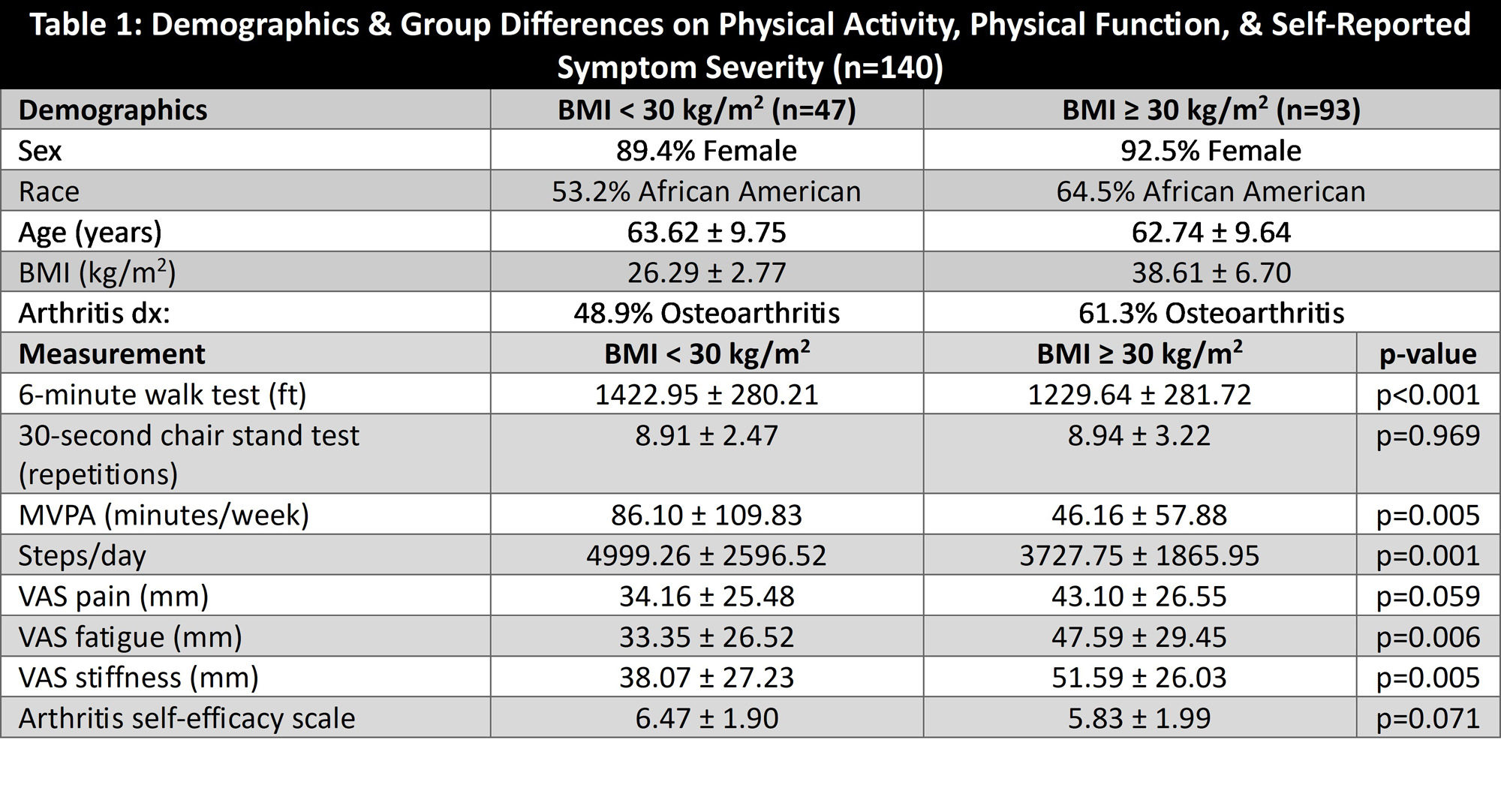Session Information
Session Type: Abstract Session
Session Time: 2:00PM-3:30PM
Background/Purpose: Engagement in moderate-vigorous physical activity (MVPA) is recommended for individuals with obesity to promote weight loss and mitigate severity of chronic diseases associated with higher levels of adiposity. However, limited research has examined the role that weight status plays on physical function, physical activity, and symptoms severity for individuals with arthritis. Therefore, this study compared differences in physical activity; physical function; and arthritis pain, stiffness, fatigue, and self-efficacy between individuals with and without obesity.
Methods: Participants ≥18 years with a diagnosis of arthritis from an ongoing study aimed to evaluate a phone-based version of the Walk with Ease program were included. Physical function was assessed with the 30-second chair stand and 6-minute walk. Participants wore an ActiGraph GT9x Link for 7 days. Total minutes/week of MVPA (≥2020 counts/min) and steps/day were calculated among participants with >4 valid days (≥10 hours of wear time). Weight status was calculated using body mass index (BMI); a BMI ≥30 kg/m2 indicated obesity and < 30 kg/m2 indicated absence of obesity. Self-efficacy in arthritis care was assessed with the Arthritis Self-Efficacy Scale (ASES). Symptom severity for pain, fatigue, and stiffness was assessed using a visual analog scale (VAS). Independent t-tests were used to compare mean differences in physical function; physical activity; and self-reported measures of pain, stiffness, fatigue, and self-efficacy between participants with and without obesity.
Results: A total of 140 participants were included in the analysis (91.4% female, 60.7% African American, 63.0 ± 9.7 years, BMI 34.5 ± 8.1 kg/m2). Differences between those with and without obesity are shown in Table 1. Participants without obesity were on average older than participants with obesity. Both groups were predominantly female and African American, with osteoarthritis the most common arthritis diagnosis for each. Participants without obesity were more physically active in terms of MVPA/week, steps/day, and walked a greater distance in the 6-minute walk test (p< 0.05). Participants without obesity also reported lower levels of fatigue and stiffness (p< 0.05). Pain (p=0.059) and ASES (p=0.071) approached significance such that participants without obesity reported higher levels of arthritis self-efficacy and lower levels of pain. No significant differences between groups were seen on the 30-second chair stand test (p=0.969).
Conclusion: Participants with obesity had greater impairments on the majority of tests administered along with lower levels of physical activity as compared to those without obesity. Additional coaching strategies are warranted encouraging adults with arthritis who are obese to engage in regular physical activity to assist with health-related outcomes.
To cite this abstract in AMA style:
Jamieson S, Wilcox S, Pellegrini C. Influence of Adiposity on Physical Function, Physical Activity, and Self-Reported Symptom Severity for Individuals with Arthritis Prior to Beginning a Physical Activity Promotion Intervention [abstract]. Arthritis Rheumatol. 2023; 75 (suppl 9). https://acrabstracts.org/abstract/influence-of-adiposity-on-physical-function-physical-activity-and-self-reported-symptom-severity-for-individuals-with-arthritis-prior-to-beginning-a-physical-activity-promotion-intervention/. Accessed .« Back to ACR Convergence 2023
ACR Meeting Abstracts - https://acrabstracts.org/abstract/influence-of-adiposity-on-physical-function-physical-activity-and-self-reported-symptom-severity-for-individuals-with-arthritis-prior-to-beginning-a-physical-activity-promotion-intervention/

